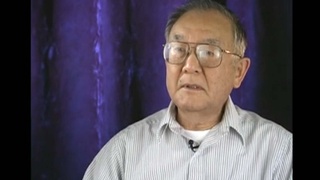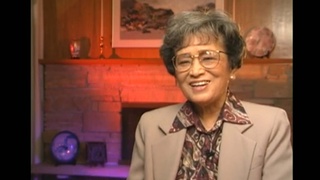Interviews
442nd’s contribution to redress
We succeeded to the extent that if it wasn’t for the 442nd there’d have been no redress. Redress was not a judicial issue no matter what anybody says. It would have never got to the Supreme Court, it a never been overruled. Maybe it should have gone back, but that isn’t in the works and isn’t the books and that isn’t the way the judicial system works. According to the judicial system, you’d have to have a similar case brought up all over again to go through the courts, and there’s not going to be another similar case. So it becomes a political issue.
And if it’s a political issue passed by Congress, then how much blood you shed and things like that count. If it wasn’t for the record of the 100th, 442nd, do you think Congress would have ever passed that? Nah. You’d have never won it on a pure logic, judicial reasoning, see. All the hard-liners would have held fast, but they can’t fight the losing of blood. And even the hard-liners when you get down to it, they say yeah, you’d be willing to Europe and fight and shed blood, but you wouldn’t fight the Japanese, see. But when you tell them about the MIS, then they have to give in, see. So yes, I say the contributions of the veterans from World War II has helped, but it hasn’t solved the problem.
Date: August 28, 1995
Location: California, US
Contributed by: Watase Media Arts Center, Japanese American National Museum
Explore More Videos

Government's permission to publish Japanese newspaper in Canada during World War II
(b. 1928) Doctor. Former Chair of the Japanese Canadian Redress Foundation.

Japanese newspaper supported by Canadian government during World War II
(b. 1928) Doctor. Former Chair of the Japanese Canadian Redress Foundation.

Sneaking out of the Hastings Park camp during World War II
(b. 1928) Doctor. Former Chair of the Japanese Canadian Redress Foundation.

Government urged Japanese Canadians to go to Japan
(b. 1928) Doctor. Former Chair of the Japanese Canadian Redress Foundation.


Closing the Japanese school and deportation (Spanish)
(b. 1932-2016) Peruvian painter


Changing Minds
(1923–2006) Community activist. Co-founded the Manzanar Committee

Prevailing Within the System
(1923–2006) Community activist. Co-founded the Manzanar Committee

Fighting For What’s Right
(1923–2006) Community activist. Co-founded the Manzanar Committee

Evolving History
(1929 - 2014) One of the earliest proponents behind the redress movement.

Need for Monetary Compensation
(1923–2008) One of the leaders behind the redress movement.

Erasing the Bitterness
(1923–2008) One of the leaders behind the redress movement.


